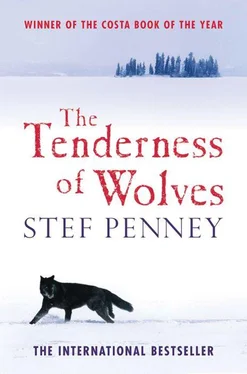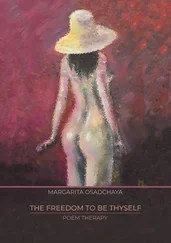‘I didn’t mean to flatter you.’
‘Don’t worry, I am not at all flattered by being compared to Niagara Falls or the Heights of Abraham.’
‘Well, just as long as you’re not …’
Maria watches her father climb the stairs–stiffly, which means he is suffering with his joints. It is awful to watch your parents age and know that pains and frailties are only going to accumulate in the body, building up until it fails completely. Maria has already developed a rather cynical outlook on life, probably another by-product of having a beautiful sister. Who has cast her usual, entirely thoughtless spell over Mr Moody.
Not that Maria is at all interested in him for herself. Not at all. But, just occasionally, it would be nice to think that she stood a chance.
It is becoming clear to me that I am going to have to do something. After Mackinley leaves I pace the kitchen until Angus returns, and I don’t have to tell him that Francis has still not come back. I tell him the fishing rods are all here, and that I hid one. Now he too looks uneasy.
‘You must go and look for him.’
‘It’s been less than three days. He’s not a child.’
‘He could have had an accident. It’s cold. He hasn’t taken any blankets.’
Angus thinks, then says he will go up to Swallow Lake tomorrow. I am so relieved I go and embrace him, only to meet with a stiff and unyielding response. He simply waits for me to detach myself, and then turns away as though nothing has happened.
Our marriage seemed to work as long as I didn’t think about it. Now, I don’t know, the more I worry about other people the less they seem to like it. When I thought of nothing but myself I only had to snap my fingers and men did whatever I wanted. Then I try to become a better person and look where it’s got me: my own husband turning away and refusing to meet my eyes. Or maybe it is none of those things, and is simply to do with age–as a woman gets older she loses the ability to charm and persuade, and there is nothing that can be done about it.
‘I could come with you.’
‘Don’t be silly.’
‘I can’t stand this waiting. What if something’s … happened?’
Angus sighs, his shoulders hunched like an old man’s. ‘Rhu …’ he breathes out the old endearment, which causes a small tremor inside me. ‘I’m sure he is all right. He will be back soon.’
I nod, touched by the endearment. In fact, I seize at it like a lifebelt–although, I think afterwards, if I am really still his ‘rhu’, his dear, why does he not look at me when he says it?
As the light fades, I go for a walk, skirt pockets bulging. At least that is what I tell Angus; whether he believes me is anyone’s guess. At this time of day everyone in Dove River sits down to eat, as predictable as a herd of cattle, so no one will be outside or anywhere they shouldn’t be. Nobody but me.
I thought about this most of the day, and decided that evening was the best time. I could have waited till dawn, but I don’t want to leave it any longer. The river is fast and high–there have been rains to the north. But the rock from where Doc Wade took his leave is dry–it is only the spring floods that cover it.
And yet there is a footprint on it. A dark, wet mark. Even in the dusk I see it. Perhaps Knox has arranged for a guardian after all. Who got bored and went for a paddle. I don’t believe it for a minute, so I creep softly down the side of the cabin, out of sight of the front door. All is silent. Perhaps I imagined it–I can no longer see the rock. I have brought a knife in my pocket, which I am now holding, rather more tightly than is necessary. It’s not really that I think for a moment the murderer would come back–for what?–but I creep on, one hand on the cabin wall, until I can listen by the window for sounds within. I stand there so long my leg goes to sleep, and I have not heard so much as a fly’s breath. I step up to the door, which is wired shut, take out the pliers and unpick the fastening. Inside is dim but I still pull the door closed, just in case.
The cabin looks exactly as I remember it, except that the bed is now empty. There is still an awful smell coming from the mattress and blankets, stacked up against the wall. I wonder who is going to wash them–or will they simply be burnt? His old mother is hardly likely to want them.
I start upstairs. It doesn’t look as though Jammet came up here very much–there are boxes and crates stacked against the walls, and dust blankets everything, showing where the men went yesterday, their feet rubbing little clearings where they stopped and peered at something. I put down the lamp and start to go through the nearest box, which contains his best clothes–an old-fashioned black coat and trousers, which I would say were too small for him. Did they belong to him when younger, or to his father? I sift through the other boxes; more clothes, some papers from the Hudson Bay Company, mainly relating to his retirement after ‘an accident incurred in the line of duty’.
Several items open doors that lead to Jammet’s other lives, before he came to Dove River. I try not to think about some of them too much: a pressed silk flower, for instance, faded with age–a token of love from a woman, or one he meant to give but didn’t? I wonder about the invisible women in his life. And here is a rare thing–a photograph that shows Jammet as a younger man, grinning his infectious smile. He is with several men I take to be voyageurs, all wearing neckerchiefs and capotes and squinting to varying degrees in the bright sunlight, clustered around a mountain of boxes and canoes, but he is the only one who could keep up a smile for that long. What occasion could have merited a photograph? Perhaps they had just beaten the record for a particularly gruelling portage. Voyageurs take pride in such things.
Having searched the boxes I pull them away from the wall. I am not sure what I think I might find but there is nothing other than dust and mouse droppings; the desiccated husks of wasps.
I go downstairs disheartened. I don’t even know what I am looking for, other than something that will confirm that Francis is nothing to do with this, which of course I already know. I cannot imagine what that might be.
I become aware that I am breathing thickly through my mouth as I go through his foodstuffs. The smell inhabits the whole building, worse than when he was still here. For the sake of thoroughness, so I will not be tormented in the night and have to come back, I stick my hand into the bins of grain and flour, and that’s when I find it. In the flour bin my hand brushes against something and I jerk backwards with a sort of yelp before I can stop myself, throwing flour everywhere. It’s a slip of paper torn from a larger piece, with numbers and letters written on it: ‘61HBKW’. Nothing else. I can’t really imagine anything less useful. Why hide a piece of paper in a flour bin if it has nonsensical letters on it, particularly if, like Jammet, you can’t read? I put it in my pocket before it occurs to me that it could have fallen into the flour bin by accident. Come to that, it could have fallen into the flour anywhere; in Scott’s warehouse, for instance. Even if Jammet did hide it, it seems hardly likely to give me the identity of his killer.
I have so far avoided the area round the bed, and am unwilling, to say the least, to put my hands on it. I should have brought gloves, but that is one thing I did not think of. I peer round inside the empty firebox while I think about it. Then something happens that very nearly causes me to faint from shock: there is a knock at the door.
I stand stock still for several seconds, but it is foolish to pretend I am not here, what with the lantern shining through the translucent windows. I stand for several more seconds, while I try to concoct a good reason for being there, but I still haven’t thought of one when the door opens and I am confronted with a man I have never seen before.
Читать дальше












